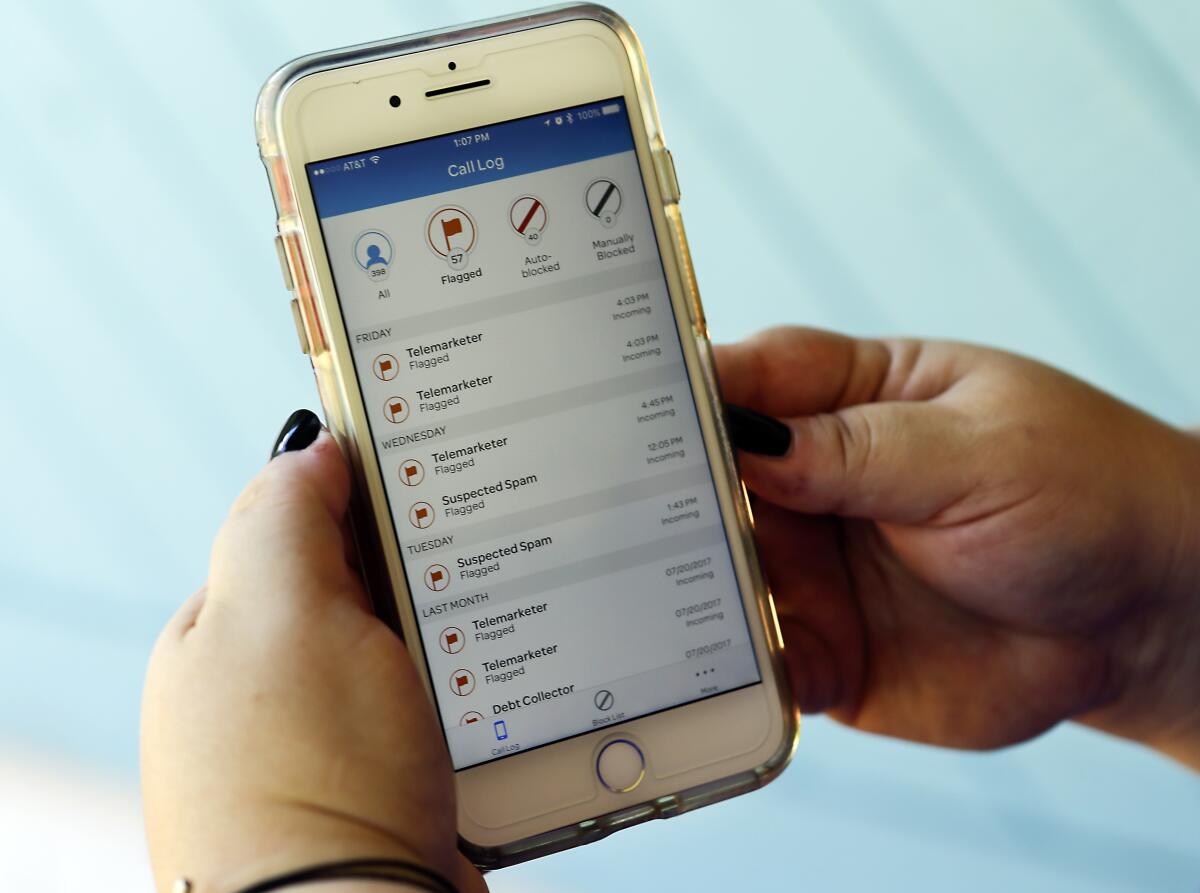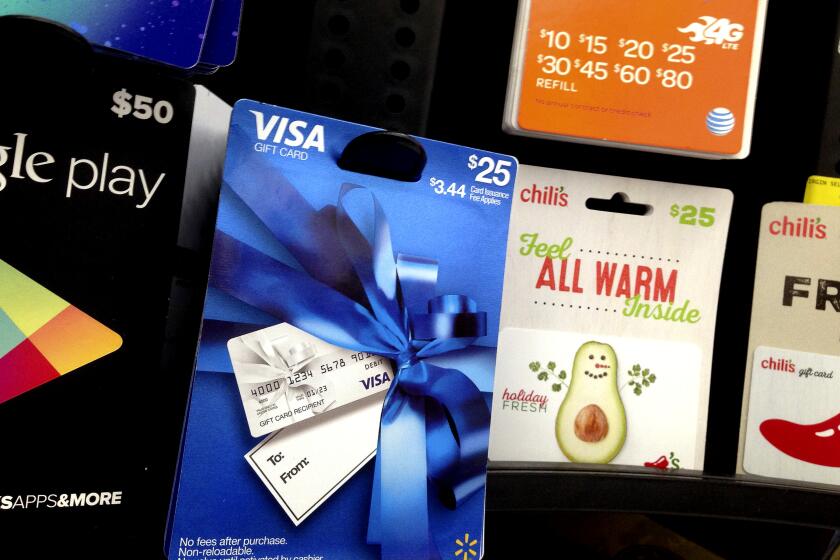Column: Consumers are receiving billions of car-warranty calls. Ignore them

- Share via
It’s hard to feel lonely working from home when you get called every day about your car warranty.
You know what I’m talking about. The robocall — it’s always a recording — warns that your vehicle warranty is expired or about to expire. By pressing “one” on your keypad, you can fix things by signing up for an extended warranty.
Spoiler alert: That extended warranty is either nonexistent or not worth the paper it’s printed on.
“Usually those so-called warranties aren’t really warranties,” said Rosemary Shahan, president of the Sacramento-based advocacy group Consumers for Auto Reliability and Safety.
“They’re cleverly worded service contracts that are obscenely overpriced and full of loopholes and exclusions,” she told me.
RoboKiller, maker of a robocall-blocking app, estimated in a recent report that Americans will receive about 13 billion car-warranty calls this year, making the calls the single most ubiquitous phone scam.
“It’s statistically possible that every smartphone owner in the United States will have received more than one car-warranty scam by the end of 2021,” the company said.
“The car-warranty robocall is projected to become the biggest phone scam since RoboKiller began monitoring robocall trends in 2017,” it added.
A Long Beach couple received what looked like an email from a neighbor asking for help. Then came the request for gift cards.
If you get one of these calls, the Federal Trade Commission says, “slam on the brakes.”
“This is an illegal robocall and likely a scam,” the agency warns. “The companies behind this type of robocall are not with your car dealer or manufacturer, and the ‘extended warranty’ they’re trying to sell you is actually a service contract that often sells for hundreds or thousands of dollars.”
I can’t think of any other telemarketing ploy that arrives with the same frequency as the car-warranty calls. I might get several in a single day, whereas one of those Social Security scam calls might come only once a week.
The volume of warranty calls has skyrocketed since the start of the pandemic. That’s due in part to many of us being stuck at home and thus easier to reach — a circumstance that’s led to a rise in almost all scams.
It’s also due to the fact that many people have been driving a lot less because of remote work and schooling, and may have lost track of routine car maintenance. You might think, “Yeah, perhaps my warranty has expired....”
Since January 2020, nearly 600,000 complaints have been lodged with the FTC over these relentless sales pitches. About 56,000 such complaints have come from Californians.
Kathy Stokes, director of fraud prevention for AARP, called these numbers “just the tip of the iceberg.”
“There are millions and millions of these calls out in the wild,” she told me. “Only a small fraction of people report them.”
Complaints to the FTC involving warranty calls are surpassed only by complaints about so-called imposter scams, such as the phony Keanu Reeves racket I wrote about the other day.
Women around the world have been duped by scammers into thinking Keanu Reeves wants to meet them — and that he could use some cash.
Over at the Federal Communications Commission, warranty calls were the top robocall complaint from consumers last year — and the number of complaints keeps rising.
The structure of this scheme makes it particularly insidious.
First you get the friendly-sounding recording that says there may be trouble with your warranty. Often that’s just a guess on the scammer’s part, but not always.
State motor vehicle records are public information. This means an enterprising fraudster can look up your car’s information online and target you if it appears you have an older vehicle.
The recording makes it sound like the call is from the dealer from which you purchased the car. This is almost certainly not the case.
While most dealers are very aggressive — too aggressive, if you ask me — in selling you added features at the time of sale, they lack the resources to follow up down the road.
Dealers will send out automated reminders for routine maintenance, typically by mail, but won’t call years after you drove off the lot with a pitch for an extended warranty.
The same goes for vehicle manufacturers. They simply won’t call with offers to extend your factory warranty.
This is an important point. Only a vehicle manufacturer can extend the warranty that came with your car. Anything else is a service contract.
“We are not aware of any auto manufacturer using telemarketing to sell service contracts,” said John Bozzella, head of the Alliance for Automotive Innovation, a manufacturing trade group.
No one at the National Automobile Dealers Assn. responded to my requests for comment.
The warranty robocall is intended to trick you into connecting with a live salesperson, who may be in a position to bait the hook even further by sharing actual details about the make and model of your car. Again, that info is publicly available.
The salesperson may be interested solely in obtaining your personal information, such as your credit card number. Or he or she may really be selling a service contract, which could top $3,000 in cost.
As Disney raises the price of its Hulu streaming service, analysts say consumers are growing pickier about which services they’ll subscribe to.
Never, ever agree then and there to such a purchase. Ask for the name of the contract provider and then check it out online. The Better Business Bureau is a good place to start, as well as review sites such as Yelp.
Ask to see a copy of the contract upfront. Any legitimate service provider will share this information.
Yet even a legit service contract can be troublesome. Make sure you read the fine print to spot any exclusions (and there will be exclusions).
For example, the service contract may say it covers engine problems, but the fine print may reveal that engine damage from overheating isn’t covered, or that replacement of key parts and components are your responsibility.
Never believe the salesperson if he or she says a service contract covers everything. Unless it says that in writing, it doesn’t.
Also, the contract, like your health insurance, may include a deductible, leaving you on the hook for at least a portion of all repairs. Find out how much that may be.
The best approach, said AARP’s Stokes, is to never answer the phone if you don’t recognize the number. Let it go to voicemail.
A legitimate firm will leave a legitimate message. Scammers will not. They want you on the line.
“Scammers are really good at what they do,” Stokes said. “Their goal is to get you into a heightened emotional state that affects your reasoning.”
A study finds it can take an hour and a half to read the user contract and privacy policy of big-name tech companies. That’s ridiculous.
This has been easier during the pandemic, she observed, because we’re all in a heightened emotional state. Every cruddy day.
Things will return to normal, eventually. And you’ll need your car to be reliable again.
Take it to a mechanic or dealer you trust. If your warranty has run out, ask if a service contract makes sense.
In most cases, the smarter play is to set money aside on a regular basis for repairs. You’ll pay less over the long run than if you spend thousands of dollars on a loophole-filled service contract.
And you’ll definitely save money if you avoid paying for a bogus warranty.
More to Read
Inside the business of entertainment
The Wide Shot brings you news, analysis and insights on everything from streaming wars to production — and what it all means for the future.
You may occasionally receive promotional content from the Los Angeles Times.














